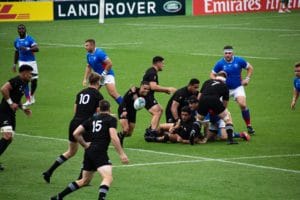In a recent blog, I explored how Not-For-Profit (NFP) organisations could apply learnings from one of the greatest sports teams, the All Blacks.
I’ve listed four important lessons that I believe NFP organisations could apply because of their “for purpose” commitment.
-
Winning culture
-
Competitive advantage
-
Leadership
-
Champions do extra
In part two, I will discuss the concepts of leadership and champions do extra and what we can learn in the NFP space from the All Blacks.
Leadership
One of the important aspects of the All Blacks’ ability to galvanise the team was the implementation of a leadership group. They understand everyone faces challenges and through increased understanding of each other comes deep respect and developing togetherness; “they are one”. The game is played on the field so All Blacks’ management set about transferring leadership from senior management to the players to enable them to make decisions on the field and lead on the field: the “you and them, became us”. This meant culture change, giving players responsibility, accountability and trust. Leadership in NFPs can seize this concept by galvanising their organisation to their mission and values, aligning their behaviours to these values and enhancing this continuously by building the character of leaders who will then create leaders within their teams.
How can this be achieved?
Through providing a continuous learning environment; through modelling behaviours outlined in contemporary competency frameworks and positive performance management frameworks all aligned to the mission, values and strategic goals of the NFP organisation. Each person in the organisation knows their position and the game play every day.
This also translates to the concept of “passing the ball” that the All Blacks refer to. Leaders must trust that with the appropriate training, skills, coaching and mentoring, staff will take on the implementation (i.e. playing the game) of the business daily. Empowerment starts with induction, on-boarding and ongoing training to ensure staff are the best they can be in their roles so they can make the right decisions each day when faced with work challenges.
An extension of having leadership groups within the All Blacks’ player group meant they grew more collaborative so they could grow together: “together we advance”. Critical to this was the language used; “language is pivotal to a winning culture, setting the mental and physical formula for victory”, Saachi & Sacchi’s Kevin Roberts said, “a team of followers isn’t set up to win; a team of leaders steps up and finds a way”.
You will often hear sports commentators say don’t count the All Blacks out even if the scoreboard is against them; they have a way of repeatedly scoring before halftime and immediately on resumption of the second half; and opposition teams have learnt they must go the full 80 minutes against the All Blacks or they will be burnt.
By arming staff with intention and skills, leaders will enable their people to respond appropriately to changing context, without losing sight of the strategic and tactical imperatives. An important technique used by the All Blacks is storytelling; the art of using what has gone before to inform the present and create the future. NFP organisations are well-placed to use strong storytelling to inform, encourage and inspire staff to greater endeavours, as well as gathering support in the community whether that be for increased philanthropic contributions or increasing their potential talent pool for future roles.
Champions do extra
The All Blacks have an institionalised system of continuous improvement. They have to peak at the time of the World Cup every four years and when it comes to team selection the individual players need to perform week in week out. As a team, and as individual players the All Blacks go further; they continuously seek marginal gain to deliver cumulative competitive advantage. You hear some of the more senior players being first to the gym and being last to leave; the increased effort they put in to be the best they can be. Champions like the All Blacks seek the best player in each of the fifteen positions on the team; the saying goes “champions do extra”. If NFP organisations can learn anything from this additional sacrifice it may well be that “if an organisation can find 100 things in their organisation that can be done just 1% better, then they create incremental and cumulative advantage with the organisation seeing an upsurge in performance and results”. According to James Kerr, this sort of environment does two things, “eliminates unhelpful elements and introduces insightful inspiring influence”.
No-one is bigger than the team and individual brilliance in each position does not automatically lead to outstanding results. The All Blacks refer to “the enemy inside the tent”; “some of New Zealand’s favourite players have never made it to All Blacks’ status because they didn’t have what it takes; the bad apple as they say – some may have made it but they were never invited back”. This is very powerful. The All Blacks’ high standards are fundamental and enforced by the players themselves. They trace success to the connection between members of the team and their collective character; this is true of all great organisations. Great leaders protect their people, encourage connection, collaboration and collective ownership nurturing a safe environment of trust, respect and family. The learning for NFP organisations is that all levels of leadership must seek to collaborate, respect and create safe work environments, not just in their immediate teams but across divisions leading to cross pollination of knowledge sharing and improvement. And what we know is, like the All Blacks’ collective responsibility and accountability means it is not Human Resources responsibility to make this happen; like All Blacks’ management they can provide the tools and coaching, however, it is every member of every teams’ responsibility to make this a daily ritual.
Being the best you can be as an All Black also means leaving the jersey in a better place than when you received it. The All Blacks speak of being a steward of the jersey they hold for the time they are in the team. A lesson for all to take on board; if every staff member of an NFP organisation wanted to leave the organisation in a better place think how much could be achieved collectively.
The All Blacks are made up of individuals with strong character, integrity and the humility to know no one player is bigger than the team. The All Blacks have an after-game ritual where they leave the changing sheds as they found them; no one tidies up after them, they do it themselves; it is referred to as “sweeping the sheds”. Every staff member from the CEO to the volunteers in the field are important because without each other the organisation would not be able to further its purpose; it’s incumbent on all leaders to lead by example, and ensure everyone in the team is valued for their contribution and no one is bigger than the team.
NFP organisations like great sports teams are focused on their specific goal to assist people in our communities; they do a great job so let’s support them do it better!
Let’s all “sweep the sheds”.
















